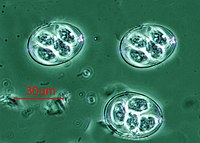
Photo from wikipedia
Avian coccidiosis is a disease caused by members of the genus Eimeria. Huge economic losses incurred by the global poultry industry due to coccidiosis have increased the need for cost-effective… Click to show full abstract
Avian coccidiosis is a disease caused by members of the genus Eimeria. Huge economic losses incurred by the global poultry industry due to coccidiosis have increased the need for cost-effective and easily available recombinant vaccines. Microneme protein 2 (MIC2) and surface antigen 1 (SAG1) of E. tenella have been recognised as potential vaccine candidates. However, the genetic diversity of the antigens in field isolates, which affects vaccine efficacy, has yet to be largely investigated. Here, we analysed genetic diversity and natural selection of etmic2 and etsag1 in Korean E. tenella isolates. Both genes exhibited low levels of genetic diversity in Korean isolates. However, the two genes showed different patterns of nucleotide diversity and amino acid polymorphism involving the E. tenella isolates obtained from different countries including China and India. These results underscore the need to investigate the genetic diversity of the vaccine candidate antigens and warrant monitoring of genetic heterogeneity and evolutionary aspects of the genes in larger numbers of E. tenella field isolates from different geographical areas to design effective coccidial vaccines.
Journal Title: Genes
Year Published: 2021
Link to full text (if available)
Share on Social Media: Sign Up to like & get
recommendations!